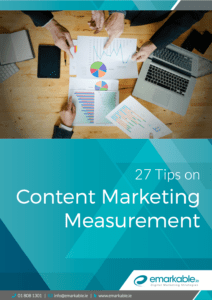Find out how your Business Can Beat Brexit
Do you want to find out what you can do to help your business beat the Brexit and face an uncertain economic future with confidence?
When the financial crisis reared its ugly head in 2008 there was a dramatic fall in domestic demand which resulted in companies rapidly turning to the export market in order to stay afloat. With the help of Enterprise Ireland and digital marketing companies like Emarkable, Irish businesses began to expand their markets outside of Ireland. This has been made possible by the increase in internet use, especially for commerce, and canny business owners have been quick to take advantage of a global audience when showcasing their products and services, resulting in an increase in business.
Brexit is now well underway and businesses in Ireland, along with those in the rest of the UK, will face some challenging times in the coming months as Brexit marches closer and becomes reality.
Now that the two-year countdown towards Brexit has begun, we’ve entered uncharted waters as Britain battles to negotiate new deals on trade, customs, transport, industrial policies, agricultural support and migration.
We’ve heard a lot of talk about a Hard Brexit vs. a Soft Brexit, but this really is over-simplifying the issue. Analysts at global investment bank, Nomura, have compiled a chart that takes a more nuanced approach to Brexit, with five different levels for Brexit ranging from the softest to the hardest:

At present the UK is Ireland’s largest trading partner, accounting for €1.2 billion in trade every week – but this could fall by 20% or more after Brexit. We may see the reintroduction of customs which will slow down trade, while tariffs may be imposed on goods, leading to higher prices for Irish consumers. The all-Ireland electricity market keeps prices low but a Brexit is likely to result in an increase in energy prices. Our common travel area with the UK is protected by EU treaties but a Brexit could result in Irish people living in the UK losing their special status and passport controls at the Irish-UK border. Common membership with the EU has supported the Peace Process but a Brexit could undermine the Good Friday Agreement, jeopardising peace and stability in Northern Ireland. In all, Ireland’s relationship with the UK is likely to be very different after the Brexit.
We’re unsure of exactly what will happen during negotiations and what sort of business scenario we’ll be facing in the future so it’s surprising that recent research carried out by InterTradeIreland revealed that a shocking 98% of companies don’t have a plan in place to deal with the consequences of Brexit. What’s more, 91% of cross-border traders have no experience of dealing with tariffs.
If you’re beginning to worry about the future of your business, don’t despair – there’s help available for business owners from government agencies, organisations and professional service companies. Just take a look at some of the help available:
In case a slowdown in the UK economy results in a decrease in demand for Irish goods and services, the Irish Exporters Association has published their top ten tips to help Irish exporters facing Brexit to diversify into the global market.
Meanwhile, InterTradeIreland offers a Brexit Advisory Service with up to date information to help companies navigate Brexit and a range of support for SMEs, including Brexit Readiness Vouchers that business owners can use to access expert advice on specific, Brexit-related queries.
If you export to or import from the UK, or have any operations in the UK (or plan to do so in future), then Brexit is likely to impact your business (and its value), creating both challenges and opportunities. Deloitte Ireland provides consulting and corporate finance services to public and private clients in a wide range of industries.
Enterprise Ireland has a wealth of information available on opportunities in the UK, together with expert guidance on what businesses should do to address the short- and long-term implications of Brexit. They’re out and about with Brexit Breakfast Roadshows, hosting several regional discussions to help business owners prepare and plan for Brexit.
Ibec represents Irish business on a domestic and international stage, lobbying government, policy makers and other key stakeholders to drive economic growth. Visit Ibec’s website where you can download Ibec’s free Brexit Toolkit pdf, “Brexit: a guide for your business” which is a 68-page guide with advice for businesses in a range of industries.
The Irish Small and Medium Enterprise Association, ISME, is an independent representative association for SMEs with more than 10,500 members. ISME’s recently published Brexit Survey makes for interesting reading on the demographics of ISME’s member companies.
The Irish Government has recently published a paper on the approach it is taking on the UK’s withdrawal from the EU. It’s a 68 page booklet that is available to download free of charge here. The paper offers comprehensive information and advice for businesses across a range of sectors and sets out the Irish Government’s action plan to support business and the economy.
The Brexit Toolkit pdf published by Ibec is also available via the Small Firms Association (SFA), the “Voice of Small Business” in Ireland which boasts more than 8,000 member companies. The SFA offers business advice and management training to Ireland’s small companies, networking opportunities and free company profiling.
PwC Ireland has some advice for businesses in Ireland in the form of a Three Step strategy to enable companies to proactively prepare themselves for Brexit and assess their exposure. With Brexit set to bring both challenges and opportunities in every sector, expert advice is vital right now.
Dublin’s’ Local Enterprise Office (LEO) also has plenty of resources for businesses to prepare for the future, with advice on issues like competition, supply chains, currency, transport and logistics to regulation and tariffs.
If you’re in the agricultural sector, then Teagasc, Ireland’s Agricultural and Food Development Authority is the place to go, it’s the national body that provides research, advisory and training services to the agricultural and food industry and rural communities. Teagasc is offering industry-specific advice on how to prepare for Brexit in Brexit and Beyond.
One of the most powerful tools available to businesses in every sector is Digital Marketing which will help your business to face the Brexit challenge by enabling you to:
- Research new markets
- Set out your stall in new markets around the world
- Generate leads from these new markets
- Develop new opportunities in new markets
- Increase your value proposition to focus on building value to counteract any cost increases which result from the introduction of new tariffs post-Brexit.
This is a lot of information for anybody to take in so if you need help with a digital marketing strategy that will enable you and your business to face the future with confidence, why not get in touch with us at Emarkable? Our experts in digital marketing and export marketing will be only too happy to help.






